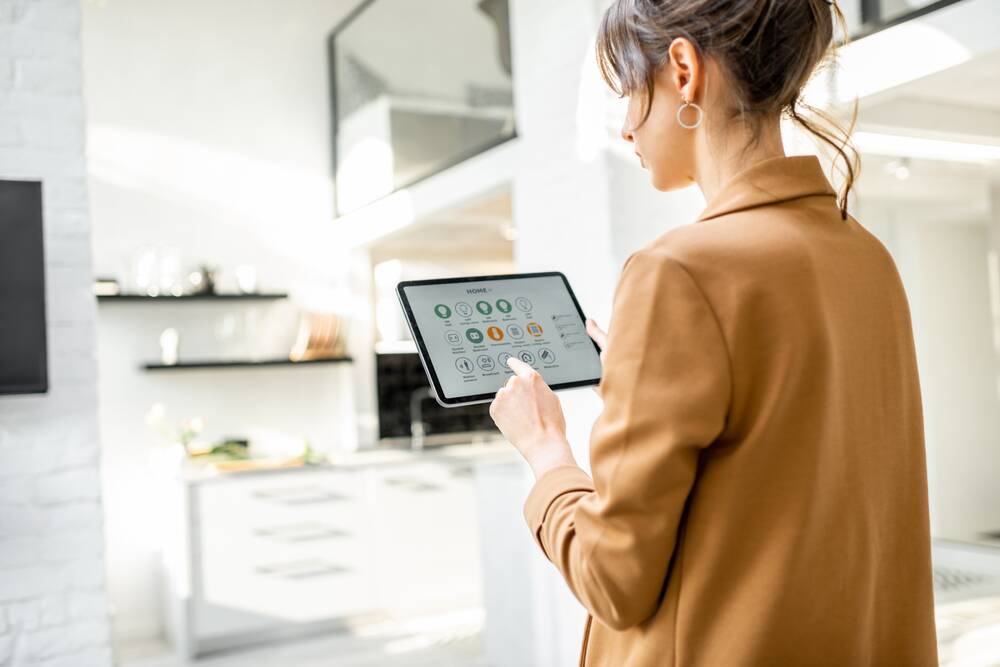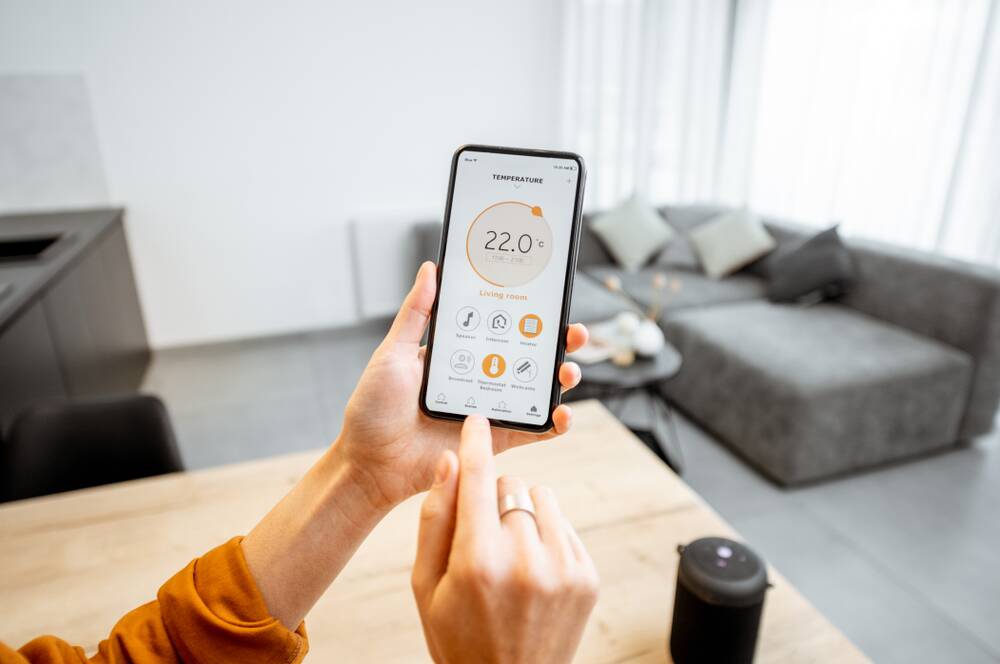Meet Mr Jetson: 5 smart home benefits that changed Tom's life

This is sponsored content for nbn.
Meet Tom and his family from the Southern Highlands, who are redefining modern living with their tech-savvy home, boasting around 260 internet-connected devices. This impressive setup has revolutionised their daily routines, showcasing the future of smart home technology.
By smart home, Tom means robots that handle repetitive tasks like vacuuming and mowing the lawn, energy usage dashboards that are monitored and adjusted in real-time, high-tech security features, and smart systems that notify them when manual tasks need attention.
To traditionalists, a smart home powered by around 260 connected devices may seem like digital overkill. However, for Tom, a software engineer, this hobby project has given him more time for 'life' and enjoying the time with his kids while they're young.
And just when you thought this futuristic way of living was beyond us, with the rapid development of smart home tech (predicted to be valued at $953 billion AUD by 2032), it is likely that Tom and his family are operating the 'home of the future' (and we're right on the cusp of it).
Thanks to nbn network upgrades happening across Australia, businesses and households are harnessing fast and reliable broadband to benefit from the convenience, productivity and creative possibilities of smart technologies at home.
In this article, we dive into some of these possibilities as we highlight five core benefits of implementing smart technology at home and share some intriguing insights from Tom's personal experience.
SECURITY
According to the ABS, an estimated 8.5% of households in Australia (856,800) experienced household crimes between 2022-23, with 358,500 experiencing physical assault.
While break-ins and assaults are not particularly nice things to think about, smart security systems are designed to prevent these events from occurring or at least deescalate them. They do this by monitoring the home and identifying potential threats in real-time, whether you're at home or away.
Unlike traditional security systems, these smart systems offer a more comprehensive solution that includes advanced customisation options and detection capabilities.
As Tom explains, "the whole wave your arms in the air [to get a sensor to register]" is over, as his security system actually has the smarts to accurately detect people, animals, cars and even breathing.
For Tom, it's not about Orwellian surveillance but ensuring safety and awareness, especially when his young kids are playing in the front yard.

COMFORT
Since COVID, there has been a steady trend of working from home, with 37% of employed Australians working from home regularly in 2023. This includes Tom and his wife, Rachael, who both work from home full-time.
Working from home means spending more time in your living space. It's crucial for the environment to be as comfortable and conducive to productivity as possible.
For Tom, this means living in a home where lights automatically turn on as he walks through the house and the heating is switched on remotely, so he can "enjoy the comfort of coming home to a warm house".
Comforts for Tom also include factors like faster internet speeds offered across nbn's network, which means his family can operate at full capacity while working from home.
ENERGY EFFICIENCY
In theory, more devices should mean more energy consumption, but many smart home technologies are designed to help people monitor, adjust and control energy use.
This includes smart thermostats that adjust heating and cooling based on schedules, and lighting that can be programmed to turn off automatically when you are not in the room.
Talking to Tom, he was truly excited by the amounts of data that can be extracted from these home systems. Since smart home systems allow for precise control and automation, I can see how it would be rewarding to identify and cut down on energy waste based on live data.
Tom also emphasised that the energy usage of running the devices "essentially costs him nothing" because of his use of solar panels to power his energy supply (and reduce his overall expenses).
Another benefit of monitoring energy consumption is that the data makes it possible to factor in manageable comforts.
For Tom, this includes luxuries for his children, like smart blankets that turn on for the kids before bed and turn off when they get under the covers, allowing them to enjoy a bit of comfort while saving on energy consumption.

ENTERTAINMENT
Smart home entertainment systems can bring a new level of enjoyment to your living space. They integrate high-quality audio and visual systems, voice control, easy-to-use interfaces, and streaming services, allowing you to manage all your entertainment needs seamlessly.
With features like immersive home theatre setups, it's possible to customise your entertainment experience to suit any occasion.
Before speaking with Tom, I made the assumption that we'd talk about his home entertainment setup, but we actually talked about how smart technology enables entertainment to be limited for the kids' development.
The benefit of smart entertainment obviously goes both ways.
Unsurprisingly, limiting internet usage has become a common theme for parents raising children in today's digital age, as parents strive to balance screen time with healthy offline activities for their children.
As Tom goes on to explain, while they're a "very technology driven household that values technology... we also understand some of the damage that some entertainment can do with the kids". For Tom, this can be mitigated by imposing restrictions on tablet usage.
The tablets in their household turn off automatically at 5pm. This is mainly because Tom is passionate about the research that shows that tablet usage "keeps them stimulated later in the night which can interrupt their sleep".
Due to their young age, Tom also limits some of the content they can watch, unless it's approved learning content.
CONVENIENCE
Smart home technology can significantly make your day-to-day life routine feel more convenient, as various household functions can be controlled remotely through smart phones or voice commands.
With automated systems, tasks such as adjusting thermostats, managing lighting, and locking doors can be done effortlessly.
One convenience that Tom can't live without is his automated lawn mowing robot. This means Tom doesn't have to mow the lawn anymore, and he gets his Saturdays back during summer.
"That's the biggest impact, I think [to my day-to-day life] because I get back every weekend, and that's time I can spend with the kids or doing things I'm passionate about."
And whether you think this is the height of genius or the height of laziness, it doesn't really matter. These novel conveniences can save you time and energy.
More than half of smart home users report that these devices save them around 30 minutes each day by automating routine tasks, which adds up to 182.5 hours saved annually (but who's counting?)
Tom's response to comments of laziness is "throughout human civilisation, we've slowly got better at making things more efficient... This [a smart home] is just the next evolution of that."
LET ME RECAP
If, like me, you're on the fence about having an entirely integrated home, it might be because you don't know how this technology could change us as humans, or maybe you enjoy the old way of doing things.
Doomsday sci-fi flicks might also play a part.
Perhaps the best thing about a smart home is that it can be customised to suit your preferences.
I wouldn't mind tracking where my energy consumption is going in real-time. A robot lawn mower and a home theatre system would make a nice Christmas present too, so I do hope Santa's listening.
And while more devices generally means more energy use, with solar power and smart features that can monitor and adjust energy consumption, it's possible to still live sustainably.
In other words, you may have your cake and eat it too.
Thanks to nbn's network, Tom's smart home lifestyle has completely come to fruition. Without the nbn, Tom believes that the benefits of a smart home and a work from home lifestyle would not be possible.


